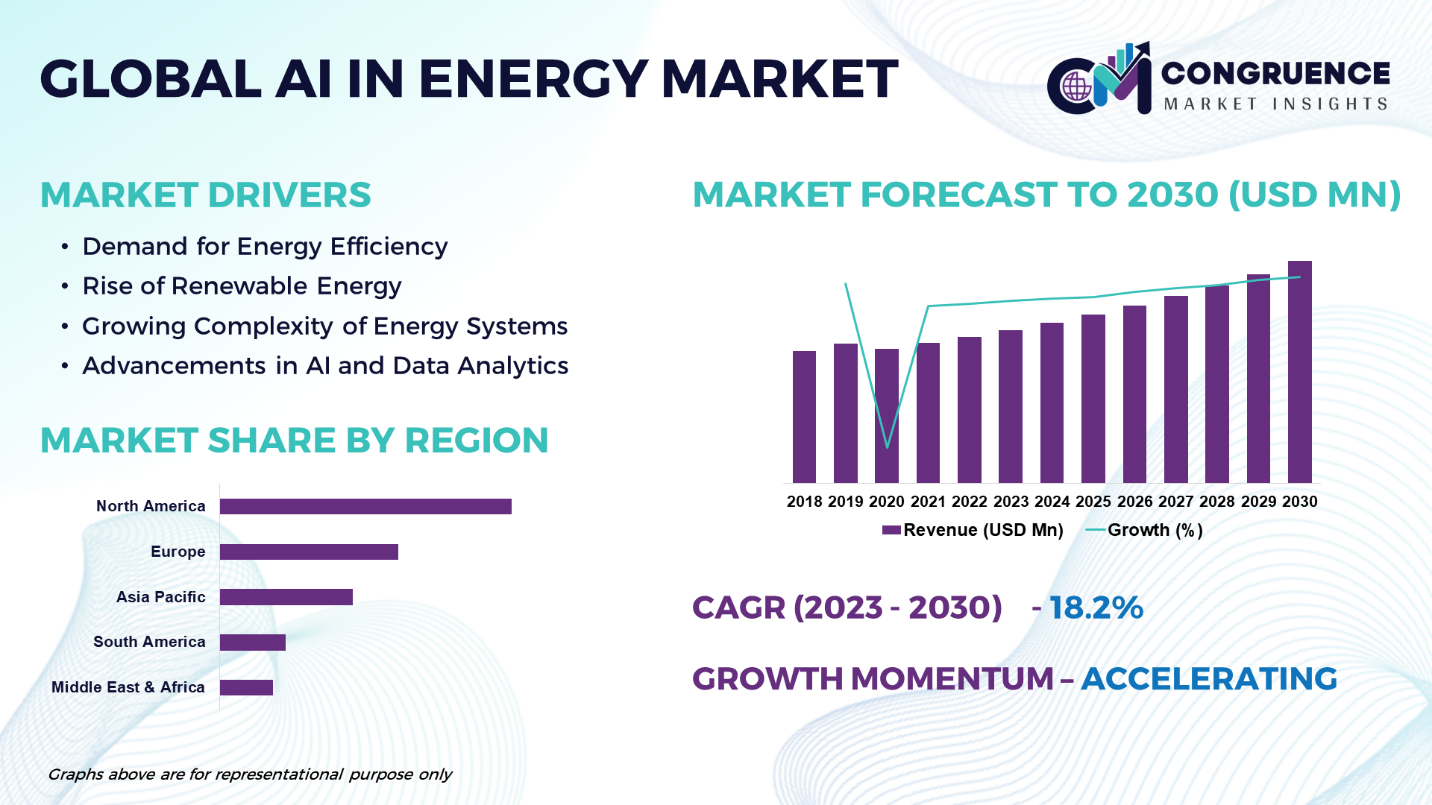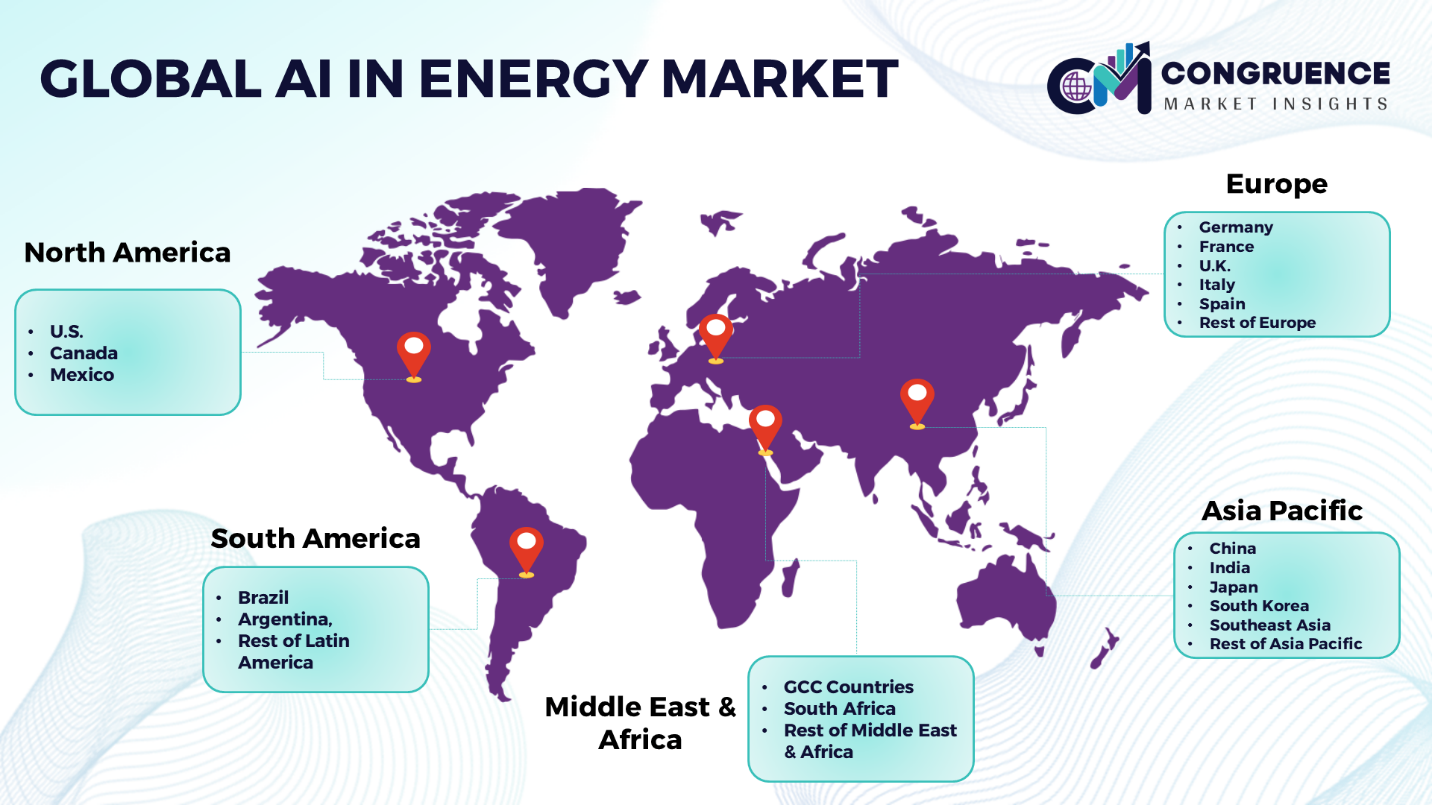Reports
The Global AI in Energy Market is expected to expand at a CAGR of 18.2% between 2023 and 2030. Technology breakthroughs in Artificial Intelligence (AI) are poised to revolutionize the global energy sector. AI develops as a potent instrument for transforming the production, transmission, distribution, and consumption of energy as the globe struggles with issues such as climate change, resource depletion, and energy security. Artificial Intelligence (AI) technologies, including machine learning, predictive analytics, and autonomous systems, are finding their way into the energy sector in a number of ways, from demand-side management and grid optimization to the deployment of renewable energy. AI helps energy stakeholders to optimize operations, increase efficiency, and hasten the shift to a sustainable energy future by leveraging data and automation. Artificial Intelligence is essential for maximizing the efficiency of hydroelectric, solar, and wind power systems. In order to predict energy generation patterns more accurately, advanced forecasting models use artificial intelligence (AI). This allows grid operators to anticipate swings in renewable energy output and maximize grid stability and dependability. Energy businesses may also maximize asset management, maintenance, and performance monitoring along the whole energy value chain thanks to AI-driven data. Artificial intelligence (AI) systems detect inefficiencies, predict equipment breakdowns, and improve energy production processes by evaluating massive volumes of sensor data and operational metrics in real-time. This ultimately minimizes costs and maximizes uptime.

AI in Energy Market Major Driving Forces
Demand for Energy Efficiency: As the importance of sustainability and energy efficiency grows, so does the need for AI-driven solutions to maximize energy use, minimize waste, and improve overall efficiency in the production, transmission, and consumption of energy.
Rise of Renewable Energy: As a result of the world's increasing reliance on renewable energy sources including wind and solar power, artificial intelligence (AI) technologies are being used more widely to predict more accurately, integrate renewable resources more successfully into the grid, and maximize the production of renewable energy.
Growing Complexity of Energy Systems: AI-powered solutions are required to manage and optimize energy systems in real-time due to the growing complexity of energy systems, which includes the proliferation of distributed energy supplies, intermittent renewable generation, and changing demand patterns.
Advancements in AI and Data Analytics: Rapid advancements in AI algorithms, machine learning techniques, and data analytics capabilities enable more sophisticated analysis of energy data, leading to improved decision-making, predictive maintenance, and operational optimization across the energy value chain.
AI in Energy Market Key Opportunities
Energy Management Solutions: The demand for AI-driven energy management solutions presents an opportunity for companies to develop innovative platforms that enable real-time monitoring, optimization, and control of energy consumption in residential, commercial, and industrial settings.
Grid Optimization and Stability: Opportunities exist for AI technologies to optimize grid operations, enhance stability, and integrate renewable energy sources more effectively into the grid. Companies can capitalize on this by developing AI-powered solutions for grid management, forecasting, and demand response.
Predictive Maintenance: AI offers opportunities to implement predictive maintenance strategies for energy infrastructure, including power plants, transmission lines, and distribution networks. Companies can develop predictive maintenance solutions that leverage AI algorithms to identify equipment failures before they occur, reducing downtime and maintenance costs.
AI in Energy Market Key Trends
· Adoption of AI-driven predictive maintenance solutions to optimize energy infrastructure performance.
· Integration of AI algorithms for real-time grid optimization and stability enhancement.
· Emergence of AI-powered demand response platforms for efficient energy consumption management.
· Increasing deployment of AI in energy storage optimization to enhance efficiency and grid resilience.
· Growth of AI-driven energy trading platforms for market intelligence and optimization.
· Expansion of decentralized energy systems supported by AI technologies for grid balancing.
· Rising demand for AI-enabled energy management solutions to optimize consumption and reduce costs.
· Focus on AI-driven analytics for energy efficiency improvements and sustainability initiatives.
· Collaboration between energy companies and AI providers to develop innovative solutions for the energy sector.
· Exploration of AI applications in renewable energy forecasting and integration for enhanced grid reliability.

Market Competition Landscape
The presence of both domestic and foreign competitors defines the AI market's competitive landscape in the energy sector. Due to mergers and acquisitions, wherein larger corporations have purchased smaller enterprises in order to enhance their market position and develop their skills, the AI in the energy industry has concentrated. Notable businesses with a broad range of goods and services and a global presence have arisen as a result of this trend. Businesses in the AI energy sector are embracing innovative technologies at a rapid pace to enhance project efficiency, safety, and environmental sustainability. Companies with a broad geographic reach can access a wider range of markets and opportunities more effectively. By leveraging their local or global presence, they may expand their project portfolio and get a larger market share. Local and regional pipeline contractors have an advantage over rivals in their specialized marketplaces as they are acquainted with local regulations, cultural peculiarities, and project-specific requirements.
Prominent entities in the worldwide artificial intelligence energy sector employ several tactics, both natural and synthetic, to fortify and enhance their market standing. Leading companies in the industry include:
· Google LLC
· General Electric Company (GE)
· Siemens AG
· IBM Corporation
· Schneider Electric SE
· Microsoft Corporation
· Oracle Corporation
· ABB Ltd.
· Cisco Systems, Inc.
· Honeywell International Inc.
· Amazon Web Services, Inc. (AWS)
· Tesla, Inc.
· Enel S.p.A.
· Vestas Wind Systems A/S
· E.ON SE
|
Report Attribute/Metric |
Details |
|
Base Year |
2022 |
|
Forecast Period |
2023 – 2030 |
|
Historical Data |
2018 to 2022 |
|
Forecast Unit |
Value (US$ Mn) |
|
Key Report Deliverable |
Revenue Forecast, Growth Trends, Market Dynamics, Segmental Overview, Regional and Country-wise Analysis, Competition Landscape |
|
Segments Covered |
· By Solution (Predictive Maintenance, Grid Optimization, Demand Response, Energy Storage Optimization, Energy Trading, Energy Management, Others) · By Deployment (On-Premises, Cloud) · By End-user (Utilities, Energy Generation Companies, Industrial, Commercial, Residential) |
|
Geographies Covered |
North America: U.S., Canada and Mexico Europe: Germany, France, U.K., Italy, Spain, and Rest of Europe Asia Pacific: China, India, Japan, South Korea, Southeast Asia, and Rest of Asia Pacific South America: Brazil, Argentina, and Rest of Latin America Middle East & Africa: GCC Countries, South Africa, and Rest of Middle East & Africa |
|
Key Players Analyzed |
Google LLC, General Electric Company (GE), Siemens AG, IBM Corporation, Schneider Electric SE, Microsoft Corporation, Oracle Corporation, ABB Ltd., Cisco Systems, Inc., Honeywell International Inc., Amazon Web Services, Inc. (AWS), Tesla, Inc., Enel S.p.A., Vestas Wind Systems A/S, E.ON SE |
|
Customization & Pricing |
Available on Request (10% Customization is Free) |
